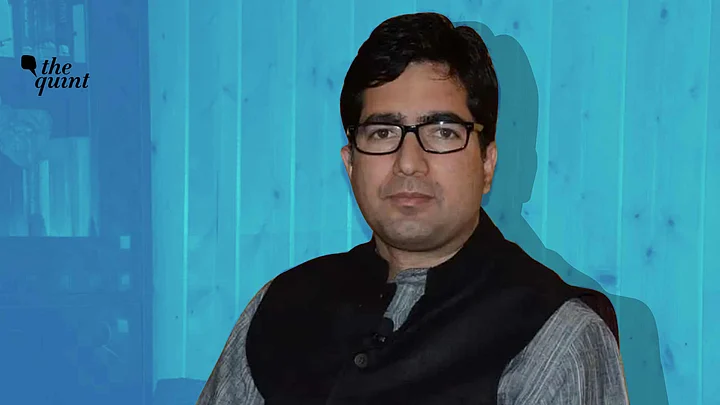After dabbling with a high-profile career as a politician, Shah Faesal, the young man who topped the 2009 IAS exam, is back at an office desk. But former Jammu & Kashmir Chief Minister, Omar Abdullah, confirms that Shah was in touch with top leaders of the National Conference (NC) for a while even before he announced his resignation in 2019.
“I’d had a few meetings with Faesal. He and [former JNU student leader] Shehla Rashid were both going to join us after he resigned from the IAS,” said Omar.
He added, “Discussions for Faesal to join NC had reached a very advanced stage. It had been conveyed by the party president [Farooq Abdullah] to a few senior colleagues that Faesal would be fielded on an NC ticket from north Kashmir.”
Omar further said, “Initially, I tried to convince him not to resign from service. But when he was determined to quit, I was keen that he fight the Lok Sabha election. What went wrong is a tragedy of missteps.”
A Change of Mind
There was also talk of Shah joining the Peoples Democratic Party (PDP); he had worked closely with key PDP leaders when they were in power. The Congress also reached out to him, and top-level meetings were apparently held in New Delhi.
But, influenced perhaps by this host of invitations, and a wave of ephemeral social media support, the young man changed his mind about joining any established party. He briefly set up his own party instead, along with Shehla Rashid.
Faesal's Support for ‘Engineer’ Abdul Rashid
It is remarkable that Shah’s place in the IAS cadre remained safe through it all. The government never accepted his much-talked-of resignation.
He would have known, however, that he was still on the rolls – when he launched the new party, when he tried to head to Turkey soon after the constitutional changes in Jammu & Kashmir, and when he indicated his backing for ‘Engineer’ Abdul Rashid for the north Kashmir parliamentary seat in 2019 after he spurned the NC’s offer.
Making the most of Faesal’s support, Abdul Rashid, who has built his politics around what is sometimes called `soft separatism’, fared far better than most observers expected. But the NC finally won all three Valley seats.
The upshot of all these twists and turns was that Faesal’s employers – the government of India – avoided the possibility that the most high-profile official from the erstwhile state might have made a potentially embarrassing issue of the constitutional changes. Having already announced his resignation well before those changes, he couldn’t resign in protest.
Bureaucracy Rules J&K
A key lesson of this little saga is that what appeared to be a massive shift when constitutional changes were made in August 2019 has turned out to be not so big a deal. Faesal’s return underlines the fact that things are on an even keel. Further, it re-emphasises that bureaucracy rules Jammu & Kashmir; it’s currently better to be an officer than a politician in the Union Territory of Jammu and Kashmir.
Ever since the constitutional changes, I’ve said that the most vital – and only popular – part of what happened was the sidelining of the political class. If mainstream politicians are on the margins, the politics of the Hurriyat (freedom) and its likes have simply disappeared. The prospects of a career espousing special status, autonomy, azadi, etc., don’t seem very bright at this point.
It’s been about 50 years since the titan, Sheikh Abdullah, learnt that one doesn’t win against the might of the state, even (at least in his case) with the putative backing of major world powers. If the state is patient, it prevails.
Abdullah returned to power as Chief Minister in 1975 after having been designated Prime Minister of the state until he was arrested in 1953. Shah has returned to where he was four years ago, much faster than Abdullah did, and with his seniority in the service intact.
Disillusioned With the Opposition
To understand the larger trends, one need only note the restraint with which Omar, the most popular politician in the Union Territory, makes the few points he does make. In fact, when I interviewed him last summer, he went out of his way to dissociate himself from the opposition.
Of course, he has good reason to be disappointed with regional parties. As soon as the constitutional changes were introduced, I noted in an article that it was a grievous blow to federalism, which ought to deeply worry the so-called regional parties. Yet, many of those parties accepted the scrapping of a state without demur.
But surely, Omar’s strategy stems from more than disappointment with one debate. It’s clear that not much is to be gained from hoping for support from the national opposition. As things stand, working within the available parameters might seem like a better bet. That, it seems, is what Shah, too, has decided.
(The writer is the author of ‘The Story of Kashmir’ and ‘The Generation of Rage in Kashmir’. He can be reached at @david_devadas. This is an opinion piece and the views expressed above are the author’s own. The Quint neither endorses nor is responsible for the same.)
